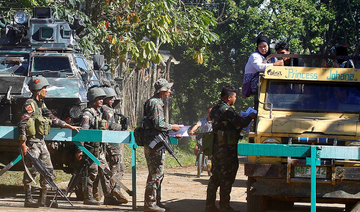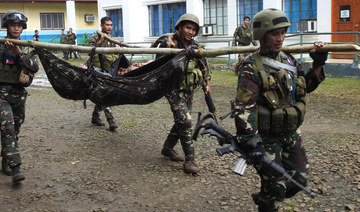MANILA: Philippine government forces have killed a notorious Abu Sayyaf Group (ASG) commander, blamed for a series of kidnappings for ransom in the southern Philippines, along with three other ASG members during an intense battle on Sunday, officials said.
A report from the military’s Western Mindanao Command (Wesmincom) identified the ASG commander as Injam Yadah, who was killed in a joint military and police operation in Barangay Alat, Jolo island of Sulu province.
Two of the other slain members were identified as Al-Al Sawadjaan — reportedly the youngest brother of ASG bomb maker Mundi Sawadjaan — and a man known by the alias “Rauf.”
The identity of the third ASG member has yet to be established.
“Based on the report from the ground, combined elements of the military and police conducted a law enforcement operation to serve a warrant of arrest against ASG sub-group leader Injam Yadah ... around 2 a.m. on Sunday, June 13, 2021,” Wesmincom Commander Lt. Gen. Corleto Vinluan, Jr. said in a statement.
However, after “sensing the presence of troops” in the area, Yadah and his followers opened fire, which “prompted the government forces to retaliate.”
The Joint Task Force–Sulu (JTF) said that all four ASG members were “killed on the spot.”
“We’ve long been on the hunt for Yadah; he has a reputation of being extremely violent — beheading captured innocent civilians and security forces alike. Finally, his hideous acts will now come to a full stop,” a report obtained by Arab News quoted Maj. Gen. William Gonzales, commander of JTF-Sulu, as saying.
Meanwhile, Lt. Col. Wilfredo Borgonia, Army 35th IB commander, said Yadah was involved in the kidnapping for ransom of several foreign nationals and Filipinos, including the ex-wife and daughter of former Talipao Mayor Tambrin Tulawie in 2018.
“His latest reported activity was the kidnapping of Filipino-American Rex Triplett in Sirawai, Zamboanga Sibugay, and Dr. Moreno in Jolo, in 2020,” Borgonia said, adding that Yadah also played a vital role in the kidnapping of five Indonesian nationals in Malaysia in January 2020.
“These are the kidnap victims rescued in Tawi-Tawi early this year,” Borgonia said.
Meanwhile, Al-Al Sawadjaan, according to Borgonio, was a bomb maker and had been in his early twenties.
“All the forces under JTF-Sulu are doubling their efforts to apprehend Mundi Sawadjaan. His brothers are now dead, and we are optimistic that he will also be neutralized,” Gonzales said.
“When that day comes, we can say that we have achieved total peace in the province. The local government and people here are one with us in this endeavor,” he added.
Operating troops seized an M653 carbine, a .45 caliber pistol, bomb components, and 15 mobile phones from Yadah’s house before detaining his wife, and rescuing their three children.
Since Jan. 2021, 121 ASG members have either been killed, captured or surrendered to government forces in Sulu, according to the military, out of which 18 were killed, 86 surrendered, and 17 were apprehended.
“Congratulations to the troops of JTF-Sulu and our partners for this successful operation,” Vinluan said, adding: “JTF-Sulu continuously implements its all-out campaign to eliminate the remaining ASG personalities in the province.”



























